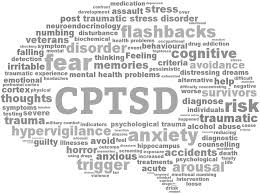What is Complex PTSD?

The original diagnosis of PTSD was based primarily on work with combat veterans and assumed to apply to survivors of other types of trauma. However, in the 1980s, clinicians and researchers began to note that the diagnosis did not seem to capture the broader impact and symptom range of survivors of more chronic and interpersonal based traumas.
In 1992, Judith Herman proposed a syndrome she called Complex Post Traumatic Stress Disorder (CPTSD). Herman suggested that CPTSD is more likely to manifest following traumas that occur in childhood, are prolonged, and are interpersonal.
Herman (1992) identifies 7 symptom groups within complex PTSD:
- Alteration in regulation of affect (emotion) and impulses
- Chronic affect dysregulation (your emotions have a life of their own)
- Difficulty modulating (managing and regulating) anger
- Self-destructive or suicidal behaviors
- Difficulty modulating sexual involvement
- Impulsive and risk-taking behaviors
- Alterations in attention or consciousness
- Amnesia
- Transient dissociative episodes (short periods of zoning out)
- Depersonalization (not feeling connected to yourself/your body)
- Somatization (physical symptoms)
- Digestive system problems
- Chronic pain
- Cardiopulmonary symptoms
- Conversion symptoms (psychological problems that get converted into physical symptoms)
- Sexual symptoms
- Panic
- Alterations in self-perception
- Chronic guilt, shame, and self-blame
- Feeling that you are permanently damaged
- Feeling ineffective
- Feeling nobody understand you
- Minimizing the importance of the traumatic events in your life
- Alterations in perception of the perpetrator (this is not needed for a diagnosis of complex PTSD)
- Adopting the distorted beliefs of the perpetrator about yourself, others, and what happened as true
- Idealizing the perpetrator
- Preoccupation with hurting the perpetrator
- Alterations in relations with others
- Inability to trust
- Revictimizing yourself
- Victimizing others
- Alterations in systems of meaning (how you see life, others, spirituality)
- Despair, hopelessness
- Loss of beliefs that previously sustained you
The new International Classification of Diseases (ICD-11) is expected to include Complex PTSD as a diagnosis, which will include the following symptoms (see "What is PTSD for more information on 1-3"):
- Re-experiencing
- Avoidance
- Sense of Threat
- Affect Dysregulation (emotional reactivity, lack of emotions, dissociation, violent outbursts and/or reckless or self-damaging behavior)
- Negative Self-Concept (persistent negative beliefs about oneself such as feelings of guilt, shame, failure, worthlessness and being defeated)
- Disruptions in Relationships (difficulty connecting with others, disinterest in initiating or maintaining relationships, conflictual relationships)
In plain English... What does CPTSD look like?
If you have CPTSD, you may experience the following:
- You may have problems with your ability to regulate emotions, especially anger.
- You may find it hard to “stay present” without becoming amnesic (unable to remember), dissociative (spaced out), depersonalized, or preoccupied with the trauma
- You may not see yourself as a functioning individual who can avoid feeling helpless, shameful, guilty, stigmatized, alone, special, or full of self-blame
- You may not have the ability to separate yourself from your abuser or perpetrator without either being preoccupied with revenge, feeling gratitude, or accepting the perpetrator’s introjects as true (introjects are someone else’s beliefs that you take into your head as your own and then believe).
- You may not have the ability to have positive, healthy relationships with others without being isolated, withdrawing, being extremely distrustful, failing repeatedly to protect yourself, or constantly searching for someone to rescue you (or someone you can rescue).
- You may not have the ability to find meaning in your life and maintain faith, hopefulness, and a sense of the future without feeling despair and hopelessness.